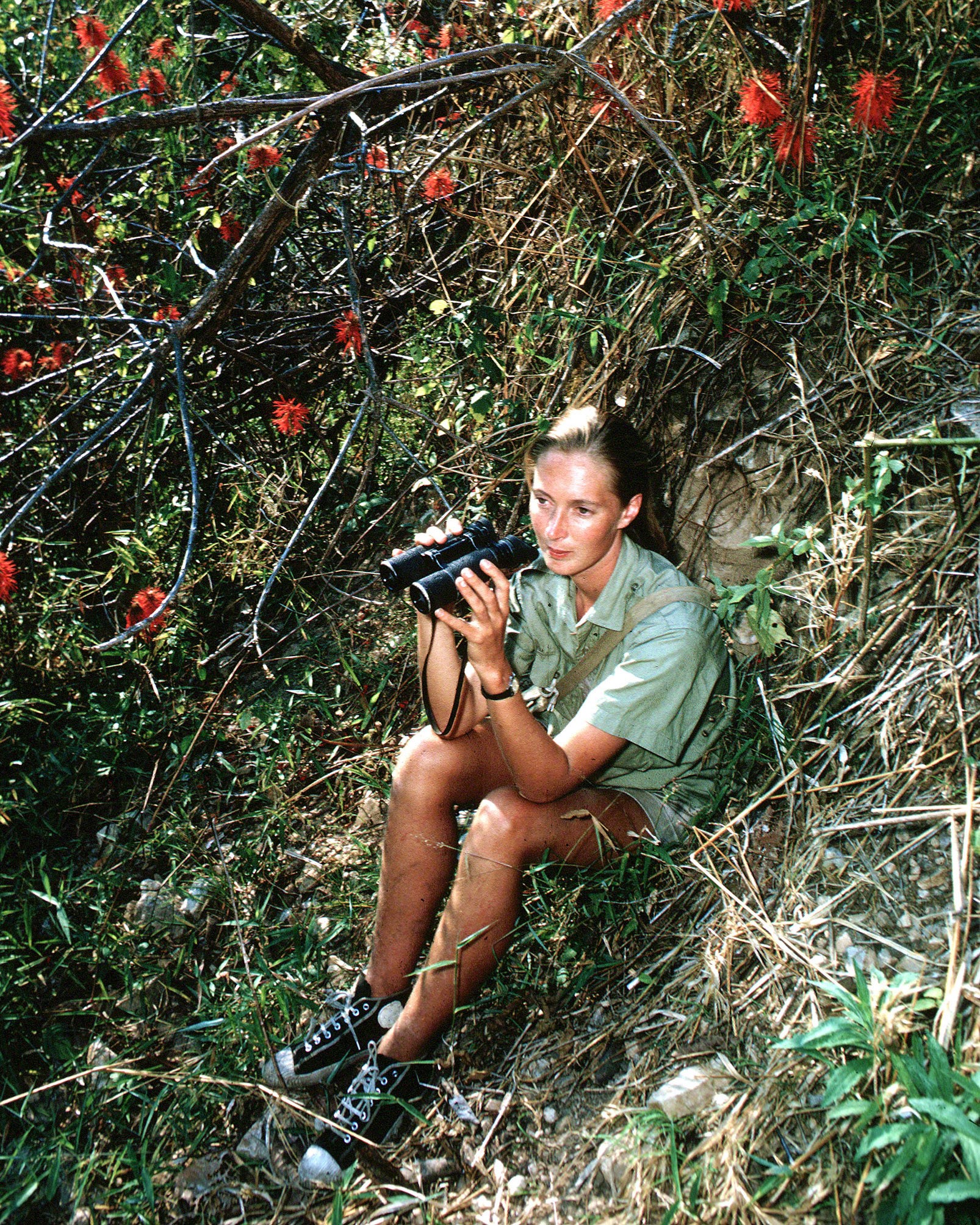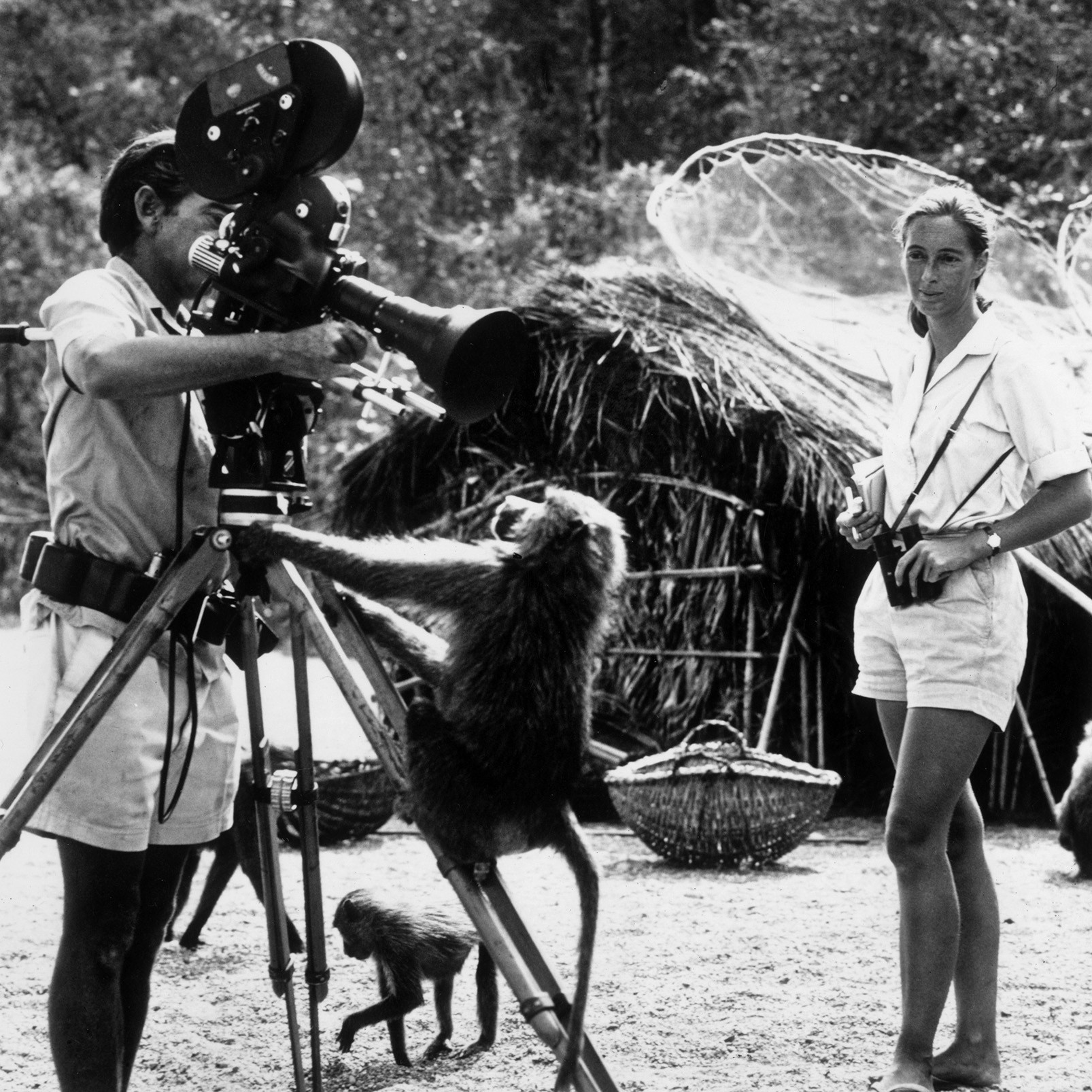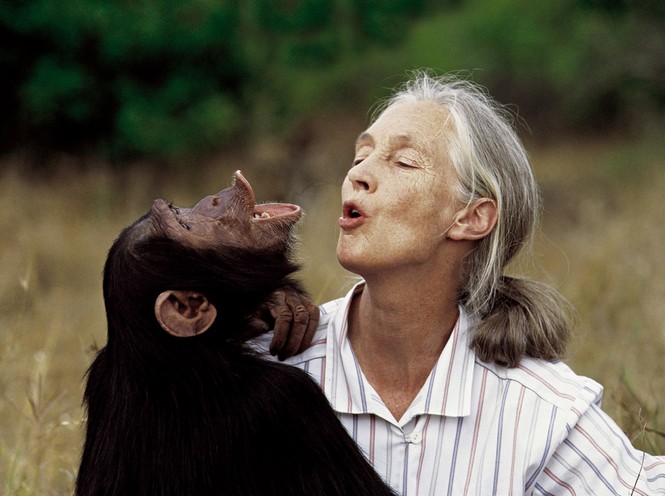This April, on the day before her 91st birthday, Jane Goodall recorded the conversation that would make her the oldest-ever guest on the podcast Call Her Daddy. Like Khloe Kardashian and Chappell Roan before her, Goodall sat in a plush pink armchair opposite host Alex Cooper, who lobbed personal questions across the ottoman. Cooper had warned her audience that the conversation “might be a little different” from the usual gossip about sex and relationships. But Goodall was willing to dish, recalling that in 1963, after the National Geographic Society began supporting her research on chimpanzees and she made her first appearance on the cover of its magazine, disgruntled male colleagues commented that “they wouldn’t put her on the cover if she didn’t have nice legs.”
“If somebody said that today, they’d be sued, right?” Goodall said to Cooper. “Back then, all I wanted was to get back to the chimps, so if my legs were getting me the money—thank you, legs! And if you look at those covers, they were jolly nice legs!”
The conversation was considerably juicier than her first major broadcast appearance, the 1965 National Geographic television special Miss Goodall and the Wild Chimpanzees, in which she followed her study subjects through the Tanzanian rainforest. But Goodall, who died yesterday in California while on a speaking tour, always knew how to use the attention she drew.


Goodall must have told her life story thousands of times, yet she did so with generosity and poise—and, often, impish humor. Born in London in 1934, she spent a wartime childhood in Bournemouth, on England’s south coast. In her early 20s, she fulfilled her childhood dream of traveling to Africa after a friend invited Goodall to visit her in Kenya. There, she sought out the anthropologist Louis Leakey, who hired her as his secretary and later offered her a job studying chimpanzees at a bare-bones research station near Lake Tanganyika. When British colonial authorities balked at the notion of a young woman living alone in the forest, Goodall’s mother agreed to join her, and they arrived at the station in July 1960.
Goodall revolutionized primatology long before she obtained any formal scientific training. After she had spent several months watching the reserve’s chimpanzees from a distance, a chimp she dubbed David Graybeard began to allow her to approach him. She saw him push a grass stem into a termite mound to fish out his meal, clearly using the stem as a tool. Then she saw him strip leaves from a twig before using the twig for the same purpose. The chimp had demonstrated both tool use and toolmaking, behaviors widely believed exclusive to humans. When Goodall reported these observations to Leakey, he responded by telegram with three now-legendary lines:
NOW WE MUST REDEFINE TOOL STOP
REDEFINE MAN STOP
OR ACCEPT CHIMPANZEES AS HUMAN
The breakthrough led to Goodall’s first National Geographic story, and after that the publicity never really stopped. Sometimes, it led to unwelcome attention: Older male colleagues questioned her abilities as a scientist and criticized her for naming the chimps she studied instead of identifying them by number. And despite her insouciance with Cooper, Goodall was initially frustrated by the focus on her personal story—she was angry that Miss Goodall and the Wild Chimpanzees included a scene of her washing her hair, and irritated when National Geographic Society officials insisted on scripting her public image. But she came to see her fame as a means to protect the animals she studied.
Goodall lived at the reserve, now Gombe National Park, for most of two decades, leaving long enough to earn her Ph.D. at Cambridge (notably without first acquiring an undergraduate degree). During her immersion in chimpanzee society, she documented a complex world previously all but unknown to science: a violent, four-year-long conflict between rival troops; several acts of cannibalism; and countless instances of chimps playing, quarreling, grooming, cuddling, and otherwise living alongside one another.
In 1986, Goodall shifted course dramatically after attending a conference of chimpanzee researchers at Lincoln Park Zoo, where she listened to report after report of deforestation at field sites and the subsequent collapse of chimpanzee populations. Goodall, whose own site was relatively protected, was shocked. “I arrived at the conference as a scientist,” she said during a visit to the zoo last month. “I left as an activist.” Once reluctant to leave Gombe, she began traveling 300 days a year to speak on behalf of chimps and their habitat, pausing only when the COVID-19 pandemic grounded her in her childhood home. “The thing is,” she told Cooper, “this mission keeps me going because there is so much to do.”

Her initial concern for chimpanzees broadened to encompass all species, including humans. Through the Jane Goodall Institute, which she created to expand her research in Gombe, she founded Roots and Shoots, a program that encourages young people to observe the needs in their communities and carry out three projects of their choosing—one for animals, one for people, and one for the environment. Goodall also widened her view of conservation in Gombe beyond the national park, founding a program to reduce deforestation by addressing poverty in the communities around Lake Tanganyika, improving medical facilities, and helping farmers prevent soil erosion. All of her efforts benefited from her fame and, often, her presence as she visited Goodall Institute projects around the world. Though she regularly acknowledged her anger about the many kinds of suffering she witnessed, she relied on her characteristic composure to win her audience to her cause. “I suppose I was born a fighter, but a fighter in a rather different way from getting out there and being aggressive, because I don’t think that works,” she reflected on her podcast in 2020. “You’ve just got to be calm and tell stories, and get people to change from within.”
In her interview with Cooper, Goodall said that some of her happiest days were those she spent far from the microphone, alone but for the company of chimps. “I’ve never felt lonely,” she told Cooper. She would walk in the forest for hours, she said, content to learn more about the chimpanzees and their ecosystem and, sometimes, to sense her own place in it. But she chose to spend most of her life being observed by her fellow primates, and she leaves us the better for it.
The post Jane Goodall Had a Genius for Fame appeared first on The Atlantic.




